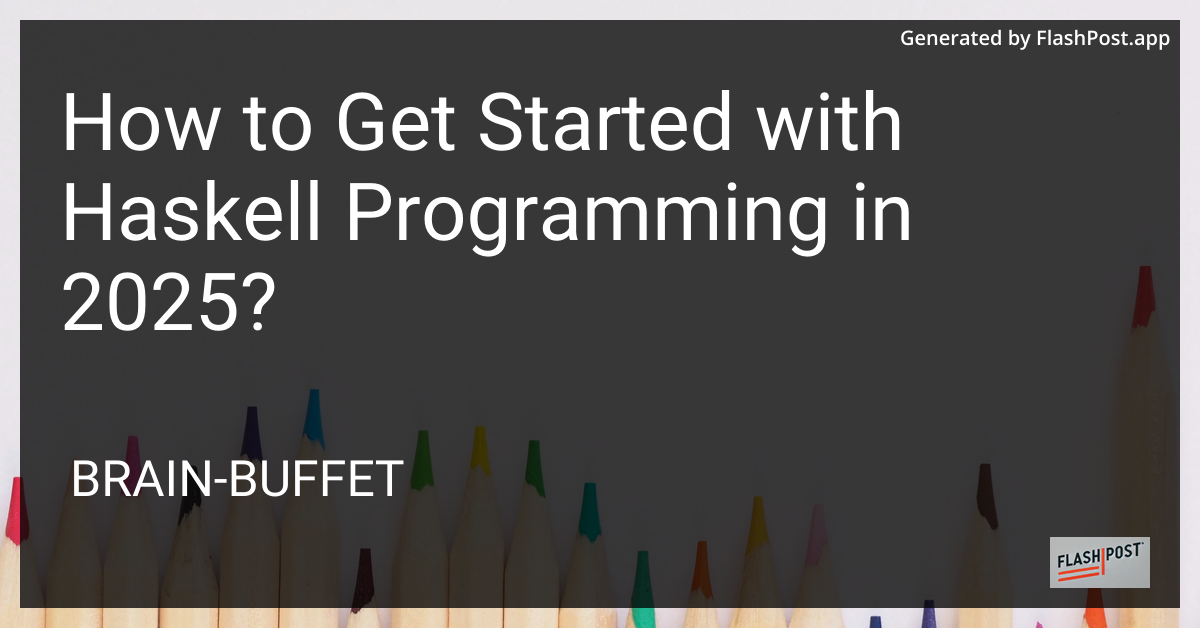How to Get Started with Haskell Programming in 2025?

Are you ready to dive into the world of Haskell programming in 2025? Haskell is a pure functional programming language known for its expressive syntax and strong static typing. It's a great language for developing both simple applications and complex systems. In this guide, we'll walk you through everything you need to get started with Haskell programming effectively.
Why Choose Haskell?
Haskell has been around for decades, and it continues to attract programmers because of its declarative nature, mathematical rigor, and advanced type system. It encourages developers to write clean and maintainable code, reducing bugs and optimizing performance.
The Advantages of Haskell Include:
- Conciseness & Readability: Haskell allows you to express complex ideas in concise code blocks.
- Static Typing: Highly secure and reduces runtime errors.
- Functional Paradigm: Encourages immutability and pure functions, leading to better predictability.
- Concurrency Support: Ideal for handling parallel computations.
Setting Up Your Haskell Environment
1. Installing the Glasgow Haskell Compiler (GHC)
GHC is the most popular compiler for Haskell. Here's how you can install it:
- On Windows and macOS: Visit the GHC official download page and follow the instructions for your OS.
- On Linux: Use your package manager. For Ubuntu:
bash sudo apt-get update sudo apt-get install haskell-platform
2. Setting Up an IDE
For a seamless Haskell programming experience, it's important to choose an Integrated Development Environment (IDE) that supports Haskell:
- VSCode: Install the Haskell extension for Visual Studio Code for syntax highlighting and integrated REPL support.
- Atom: Use Atom with the Haskell Language Server for a customizable experience.
3. Learning the Basics
Begin by familiarizing yourself with basic Haskell concepts:
- Syntax: Start coding with simple programs. Try the famous “Hello World” and build from there.
- Haskell's Type System: Understand the importance of types and learn how to define them in Haskell.
For a step-by-step guide on exiting Haskell programs gracefully, check out this simple Haskell exit tutorial.
Diving Deeper: Advanced Concepts
Once you have a handle on the basics, it's time to explore more complex topics:
The Where Clause
The where clause is essential for writing clean and concise Haskell code. For a comprehensive guide on its usage, including syntax and examples, visit this where clause in Haskell tutorial.
Embracing Functional Programming
Haskell's functional programming nature may initially be a shift from traditional imperative approaches. To truly excel, practice using higher-order functions, learn about monads, and explore Haskell's lazy evaluation model.
Community and Resources
Join Haskell communities online. Forums, Reddit, and Stack Overflow are great places to get answers to specific questions. An active community means you'll have access to a wealth of knowledge as you learn Haskell.
Conclusion
Getting started with Haskell programming in 2025 offers the chance to tackle a modern, powerful language with a rich history and a bright future. Explore its capabilities, embrace the functional paradigm, and watch your programming skills flourish. Whether you're building simple scripts or complex systems, Haskell is an excellent choice for any developer looking to broaden their skill set. ```
In this Markdown article, we've included links to resources that will help you learn Haskell effectively, ensuring you're equipped with everything you need to start your coding journey in 2025.